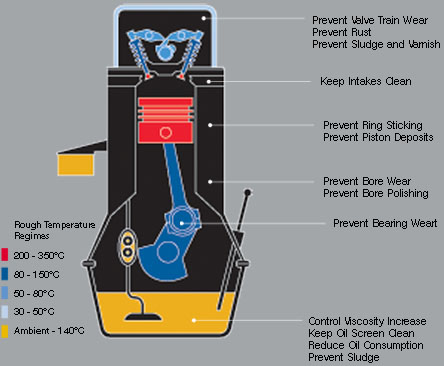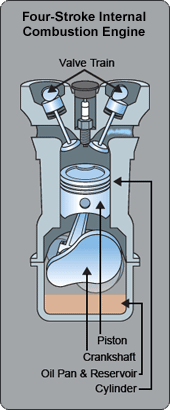Why Mobil Synthetic Oil?
- What does an engine oil really do?
- Save Fuel with Mobil 1
- What are Synthetic Oils?
- Myths about Synthetics
- Journey through an Engine
- Maximise energy efficiency with Mobil 1
What does an engine oil really do?
Lubricants secure the functionality of the engine and are considered elements of construction in engine development. An engine is a complex machine with hundreds of moving parts, all operating under a wide range of temperatures and conditions. The capability of the engine oil you select dictates how well the engine copes with these conditions and how protected your engine is against wear, corrosion and the build up of dirt and deposits.
Lubricants have a heavy influence on:
- Performance
- Fuel consumption
- Emissions
Lubricants are directly responsible for:
- Engine cleanliness
- Wear protection
- Long engine life


Save Fuel with Mobil 1
Mobil 1 can help save you fuel by improving the fuel economy of cars with petrol engines as well as cars with diesel engines.
Mobil 1 fully synthetic oils have been specifically formulated to circulate with more ease than traditional mineral oils, offering increased fuel efficiency.
They also get to work faster, so your engine reaches peak operating efficiency sooner. Traditional mineral oils take longer to circulate, making the engine thirsty and less efficient.

What are Synthetic Oils?
What is a synthetic lubricant?
A synthetic oil contains more highly refined base oils than those used in conventional mineral oils, offering superior protection and performance. Synthetic engine oils provide you with a host of benefits which keep your engine running at optimal performance for years.
To understand synthetic engine oils, you need to examine the origins of engine oils.
There are two basic types of lubricants available:
- Traditional conventional mineral oils.
- Synthetic lubricants, growing in popularity and demand.

What's so good about synthetic lubricants?
The performance of synthetic oils, in particular Mobil 1, is more robust, especially in terms of low temperature pumpability and high temperature stability and protection against deposits. These attributes translate directly into less engine wear, increased fuel economy and longer engine life.
Synthetic oils have been developed specifically to cope with extreme conditions found within modern engines. They are much more free-flowing than traditional mineral oils. The biggest benefit greatly increases engine protection. When an engine is first started, a mineral oil takes some time to circulate, allowing friction between un-lubricated parts to cause wear. In contrast, a synthetic lubricant starts circulating straight away, protecting every moving part within the engine.
Synthetic oils can also significantly improve fuel economy. During the warm-up period of a typical car journey, mineral oils are thicker and move slower, making the engine thirstier and less efficient. Because synthetics get to work much quicker, the engine reaches peak operating efficiency that much sooner.
Another advantage of synthetics is that they're cleaner and environmentally-friendlier - helping to cut engine emissions when compared to conventional mineral oils. Conventional mineral oils also contain greater amounts of impurities, such as sulfur, reactive and unstable hydrocarbons and other undesirable contaminants that cannot be completely removed by conventional refining of crude oil.
In all these important respects, synthetic lubricants easily outperform mineral oils. As a 100% synthetic oil, Mobil 1 offers significant advantages over conventional engine oils, such as:
- Outstanding protection
- Engine efficiency
- Excellent protection at high temperatures
- Minimizing oil degradation
- Faster lubrication at start-up in low temperatures
- Exceptional resistance to thermal breakdown
- Engine cleanliness
- Outstanding protection against harmful deposits
- Cleaner running engines
- Greater resistance to oil oxidation (thickening), which reduces engine drag
- Lower oil consumption under high-speed conditions
- More efficient engine operation over a wider temperature range

Myths About Synthetics
People have a lot to say about synthetic oils. Unfortunately, it's not always accurate. Let's learn the truth behind some of the most common misconceptions about synthetic oils and your vehicle.
Myth:
You should break in your engine with conventional oil, then switch to a synthetic oil like Mobil 1.
Reality:
You can start using Mobil 1 in new vehicles at any time. In the past, engine break-in was necessary to remove any metal flashing (called swarf) or abrasive material left inside the engine after machining as well as to allow the valves and rings to "seat" properly. Today's engines are built with tighter tolerances, improved machining and under cleaner conditions compared to the engines of 10 or 20 years ago. Current engine manufacturing technology does not require a break-in period using petroleum-based motor oils. In fact, Mobil 1 is installed in the factories of:
- Acura RDX
- Aston Martin
- Bentley Vehicles
- Cadillac CTS, CTS-V, Escalade, XLR, XLR-V, SRX and STS and STS-V
- Chevrolet Corvette C6 and Z06
- Chevrolet TrailBlazer SS
- Chrysler 300C SRT-8
- Chevrolet Cobalt SS
- Dodge Charger SRT-8, and Magnum SRT-8
- Holden Special Vehicles
- Jeep Grand Cherokee SRT-8
- Mercedes-AMG Vehicles
- Mercedes-Benz SLR McLaren
- Mitsubishi Evolution
- Nissan GT-R
- Pontiac Solstice GXP
- All Porsche Vehicles<
- Saturn Ion Red Line and Saturn Sky Red Line
- Dodge Viper
Therefore, Mobil 1 is used in a car, even before you drive it off the showroom floor.
Myth:
I need to flush my engine before switching to Mobil 1.
Reality:
No special preparation is necessary when switching from conventional engine oil to Mobil 1.
Myth:
Using Mobil 1 will void the warranty on my new car.
Reality:
Mobil 1 will not void new car warranties, with the exception of the Mazda rotary engine because Mazda does not recommend any synthetic engine oil. Mobil 1 exceeds the API and ILSAC engine oil service requirements for all newly imported and domestic vehicles. If in doubt, always check your vehicle owner's manual or contact your vehicle's manufacturer.
Since most new car warranties call for shorter service intervals than those enabled by Mobil 1, ExxonMobil recommends you to follow the recommendations in your owner's manual while your car is under warranty.
Refer to your vehicle service manual for correct lubricant requirement and service intervals.
Myth:
Mobil 1 requires a special oil filter.
Reality:
While ExxonMobil recommends that you use a high-quality filter, you can use the same type of oil filter that you would normally use with conventional mineral oil.
Myth:
Mobil 1 will leak out of the seals of older cars.
Reality:
Mobil 1 does not cause leaks. In fact, new Mobil 1 was tested in dozens of industry standard and original equipment manufacturers (OEMs) tests to prove its seal performance. It is fully compatible with the elastomeric materials from which automotive seals and gaskets are made. If an older engine is in good condition and does not have oil leaks, Mobil 1 provides the same advantages as it does when used in a new engine. ExxonMobil recommends taking measures to repair the leaks before using Mobil 1. ExxonMobil also recommends following the automobile manufacturer's manual for the proper oil to use.

Journey Through An Engine
Fasten your seat belt and prepare for an incredible journey. Take a ride through a Mercedes-Benz AMG V8 engine - one of the most powerful and sophisticated road car engines available.
Follow the route that Mobil 1, The World's Leading Synthetic Engine Oil, takes as it lubricates each and every moving component in an engine. Mobil 1 protects the engine, increases power and performance and reduces engine emissions, helping to protect the environment.

Maximise energy efficiency with Mobil 1
 Modern car engines have an efficiency of around 15%. The remaining 85% is wasted as heat or through friction. Mobil 1 improves these statistics by increasing the efficiency of your engine.
Modern car engines have an efficiency of around 15%. The remaining 85% is wasted as heat or through friction. Mobil 1 improves these statistics by increasing the efficiency of your engine.
There are 4 key areas in a combustion engine where energy is lost and Mobil 1 helps to improve efficiency.
How Mobil 1 maximises energy efficiency in your engine...
Helps keep your engine performing like new
The Mobil 1 range minimises wear on piston rings and cylinder bores to help keep engines performing like new for long periods of time.
Extreme cold temperature performance
Mobil 1 offers excellent performance in extreme temperature conditions, ensuring that oil flows throughout the engine even during the first few critical seconds of start-up.
Exceptional engine cleaning power
Mobil 1 lubricants are designed to keep engines clean and protect them from wear and deposit formation, even under high temperature, stressful driving conditions (start-stop city driving).
Recommended by more OEMs than any other brand in the world
Today we can claim that Mobil 1 is chosen by more OEMs than any other brand in the world.


